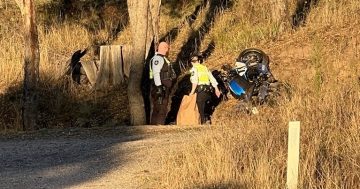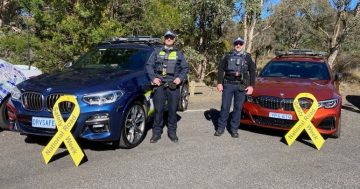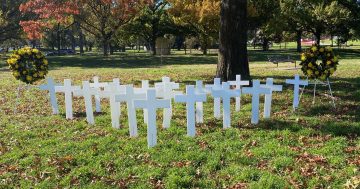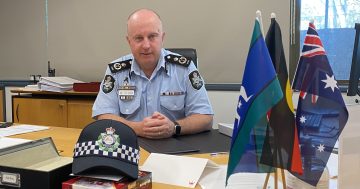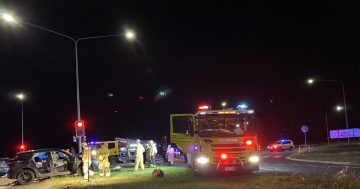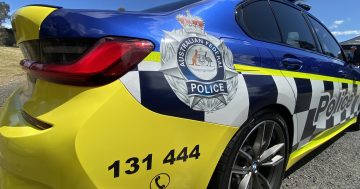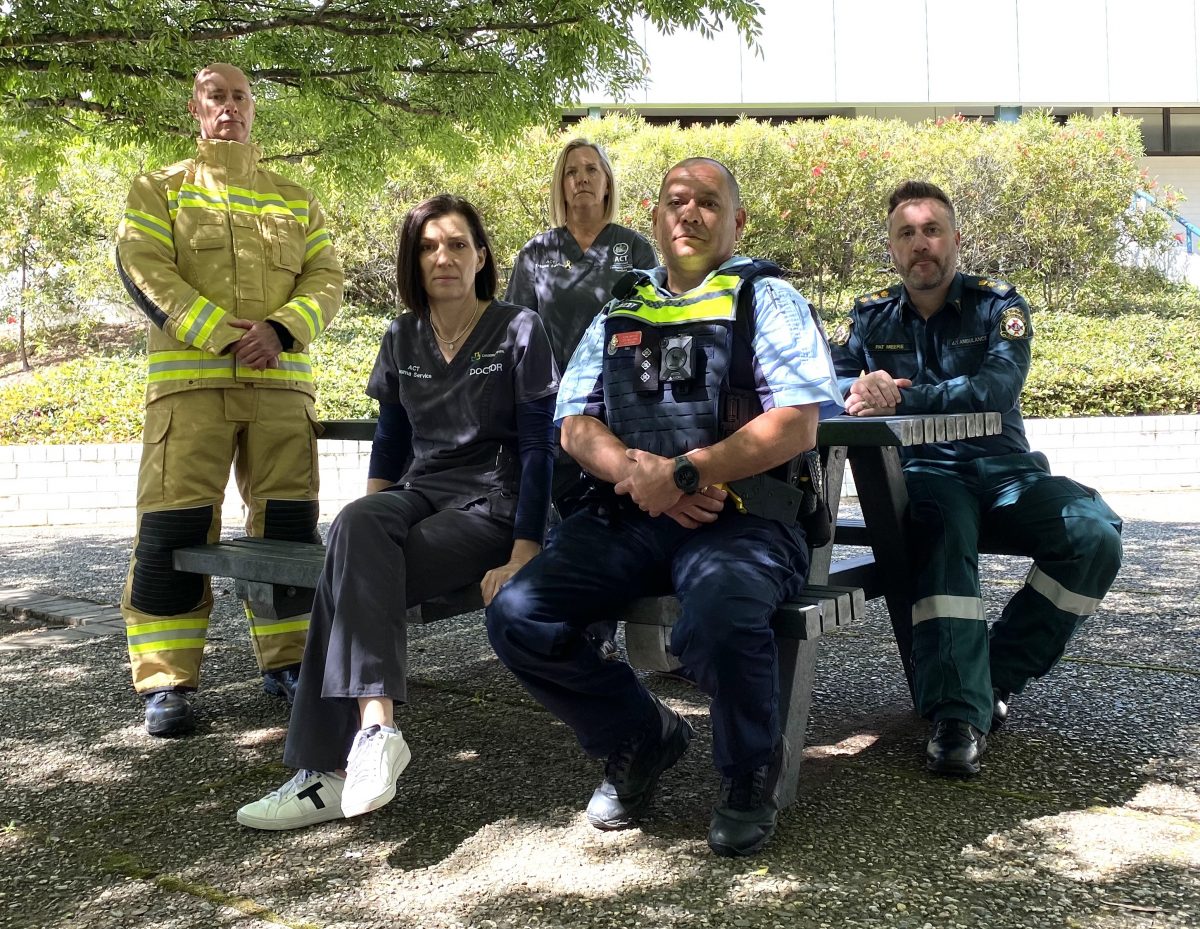
ACTFR Cmdr Guy Cassis, ACT Trauma Service director Dr Ailene Fitzgerald, registered nurse Nardine Johnson, Officer in Charge of Road Policing Act Insp Ken Williams, and intensive care paramedic Pat Meere don’t want any more people to lose their lives on our roads. Photo: Claire Fenwicke.
As we edge closer to the Christmas holiday period, our emergency services are nervous about the potential for more deaths on our roads.
So far in 2022, 18 people have been killed on Canberra’s roads – most from preventable crashes.
But there’s no reset when we ring in the New Year.
“It’s not just a calendar year. We want people going home. We want people to have birthdays. We want people to have Christmases together,” ACT Road Policing Officer in Charge Acting Inspector Ken Williams said.
“If you define it within a set year, you lose sight of the bigger picture, which is, these people aren’t going to go home.”
To recognise the deaths on our roads so far, and plead with the community not to add to the toll, our emergency services have come together for World Day of Remembrance for Road Traffic Victims.
Act Insp Williams said most of our fatalities this year could have been prevented, and they rippled beyond those killed.
“Here in Canberra, we’ve felt the unfortunate, devastating effects of 18 road fatalities this year,” he said.
“[That’s along with] countless others who’ve suffered life-long injuries or will require life-long care.
“We as a community must do better, and I urge the community to consider the consequences of poor driving choices.”
Intensive Care Paramedic Pat Meere said for everyone to come together and hopefully prevent further road trauma was a key motivator.
“It’s important to get the message out that every time you get behind the wheel of a motor vehicle, it doesn’t matter what it is; you need to think about the consequences of your actions,” he said.
“It’s really easy to float along in your bubble and think that your actions won’t have consequences for other people.
“But it’s wide-reaching. Your actions can have a consequence for yourself – which may include death – or both yourself and your family, as you may become disabled, and also your friends and colleagues and everyone else.”
ACT Trauma Service director Dr Ailene Fitzgerald said while a road death toll was a measurable number, the other impacts from a serious crash were less visible.
“It’s not just the deaths; it’s the serious road trauma which creates life-long injury and disability that’s as significant an issue,” she said.
“It’s very difficult to measure the extent of the impact of the other severe injuries on families and communities, and it is not decreasing, in my view.”
ACT Fire and Rescue Commander Guy Cassis admitted the next six to eight weeks as we entered the Christmas school holiday period was a concern.
“We’ve had 18 deaths on our roads already, and with increasing numbers [of travellers on our roads] comes an increase in risk that there could be more,” he said.
“We’re all coming back together after a period of time when we’ve had lockdowns … and maybe that’s resulted in people not being used to others around us on the roads, so we need to think about that.”
Cmdr Cassis wanted the “cumulative effects” of our road toll to stop because, at the end of the day, it was more than a yearly statistic.
“It’s not unrealistic to achieve a zero road toll. We should strive to achieve that goal,” he said.
“If everyone thinks about that while they’re driving, maybe they’ll slow down, put that distance between the vehicle in front of them, or drive to the conditions.
“Only if we do the actions that prevent accidents can we achieve that.”
Mr Meere agreed, adding he would prefer his crews not have to attend deaths on our roads at any time of the year, particularly if they’re preventable.
“I get there are other factors that do play a part in motor vehicle collisions and accidents as well, but if we modify our behaviours, I think that can go a long way in trying to achieve a zero road toll,” he said.
As ACT Policing Acting Deputy Chief Police Officer Linda Champion said, about half of this year’s fatalities were down to dangerous drivers like those targeted by Operation Toric.
Operation Toric (Traffic or Recidivist Investigations Canberra) targets high-risk offenders on ACT roads with a focus on repeat offenders.
“Fifty per cent of the problem are either alcohol and/or drug-effected, or problem drivers,” she said.
“The other 50 per cent are people not driving to the conditions, medical conditions, things like that.”
Operation Toric started as a pilot program but will now be a permanent part of the force.
For the rest of us, Cmdr Champion pleaded with everyone to slow down, drive to the conditions and avoid getting in a car with someone you know who drives dangerously.
“Even if there’s one fatality in a year, that’s one too many.”
The video can be viewed on ACT Policing’s Facebook page.












